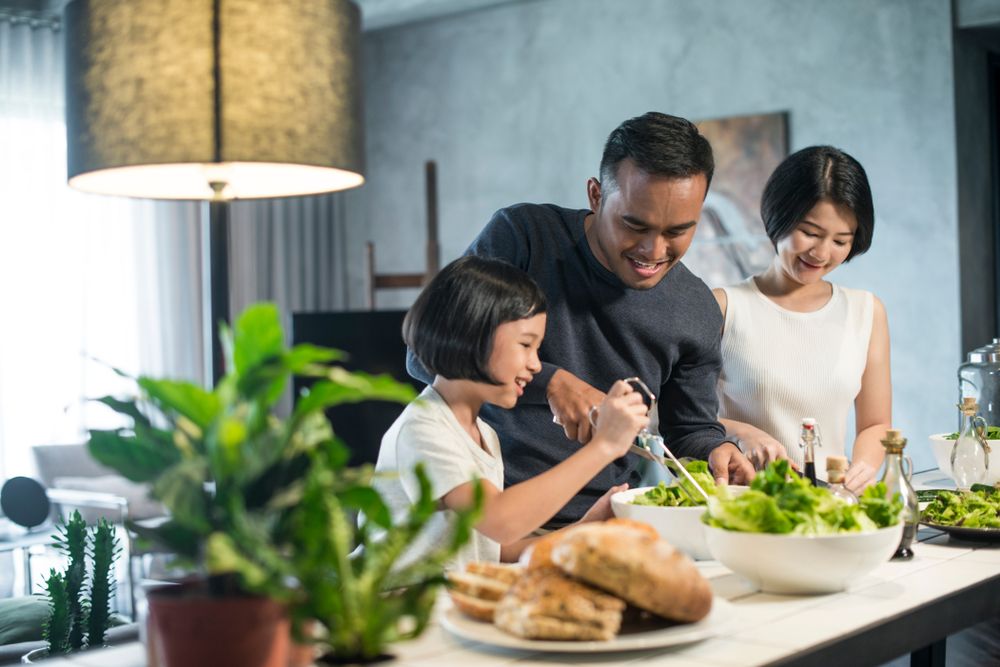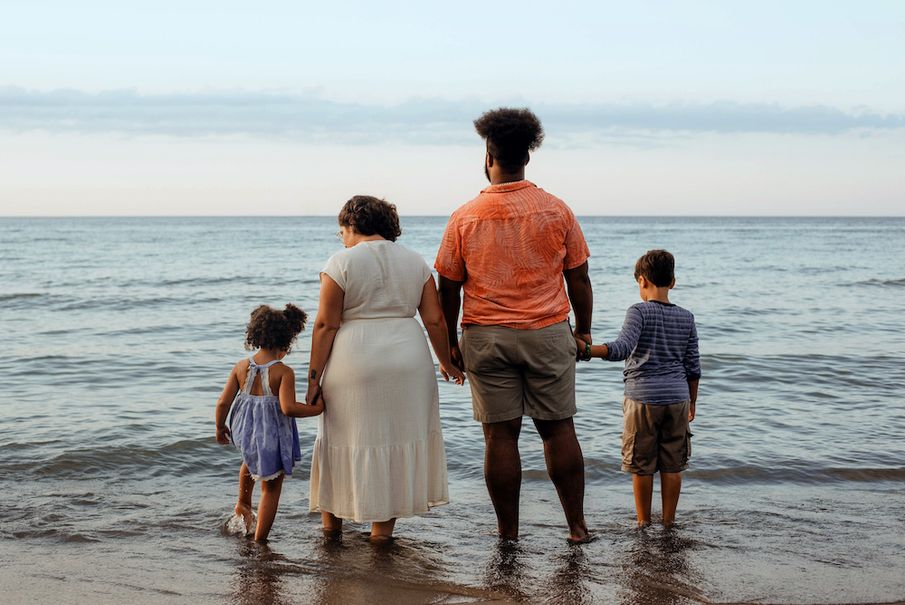Relationship counsellor Bibi Jamieson explores the joys and challenges of being mixed race, and entering into interracial relationships
There are two moments in my life that capture some of the complexities faced by interracial families. During Black History Month, my daughter (aged seven) learnt about Rosa Parks in school. She asked: “Mama, in the olden days, you would have sat at the back of the bus, and daddy would sit in front, so where would I sit?” Later that week, my son (aged eight) came home from school and said: “Dad, is it true that white people like you caught Black people like mama to be slaves?”
This was the first time I’d heard my children use the words ‘Black’ and ‘white’ when describing people. I felt like their beautiful, childish naivety had been corrupted, a door opened to some of the harsh realities of our world, and though I longed to close this door, wrap them in cotton wool, and live in our bubble of love, we talked it through.
It’s important for parents to build an open and trusting relationship with children that makes it OK for them to ask difficult questions, and to explore thoughts, feelings, and experiences around racism. This is an ongoing and necessary conversation for all, but even more so for interracial families, who may have contrasting racial histories, and therefore have different experiences of privilege and discrimination. It is also OK not to have all the answers, but to show willingness and curiosity in exploring how our children feel, to try to see the world from their eyes, and imagine how the world sees them.
When it comes to interracial relationships, as a couples therapist, I believe that all couples are intercultural. This is because each person has experienced different family dynamics, inherited beliefs, and value systems that shape their experiences and approaches to relationships.
However, interracial couples and bi-racial people have added challenges as a result of the world’s attitude to the one thing that is non-negotiable: the colour of their skin. Here, we explore some common experiences.

Feeling forced to explain your identity
In a world where race is a visual identifier, some people try placing you, in an attempt to rank you in the hierarchy system of their unconscious bias. This can often feel like a relentless interrogation, especially when in a non-diverse, mono-racial space. There may be no harm intended, but being told you look ‘exotic’, or being asked: “Where are you from-from?”, “Are you mixed-race?” can be exhausting. Even having to choose what kind of ‘mix’ you are when filling out forms – I mean, what exactly does ‘mixed other’ mean?
This can make you feel alienated and scrutinised which, over time, may negatively impact self-identity and erode self-esteem. Boundaries are necessary, and it is important to remember that you don’t have to satisfy people’s curiosity if it makes you uncomfortable. I find that a polite way to say mind your own business is: “This feels really important to you, why is that?” Remember, you get to define yourself. You can decide when, how, and to whom, you choose to respond, and how much detail you give.
The space in between
In white spaces, you might be considered an ethnic minority, and with ethnic minorities you may be seen as white. This shouldn’t matter, but as highlighted, inequality exists due to social conditioning and hidden racial bias. This sometimes creates a need for bi-racial people to prove their worthiness in order to feel included in different ethnic cultures – especially when they are misidentified as white.
Shadism also comes into play here, and therefore a lighter-skinned bi-racial person may be given privilege and preferential treatment over their darker-skinned friends and family. This can create division and tension around race conversations.
At the height of the BLM movement, I noticed bi-racial people being challenged, and made to feel they had lost their right to speak up about racial injustice with comments like: “It’s easier for light-skinned people,” “You could pass for white,” or “You’re not really Black though.” Speak up if you can, and if you find this tedious, or scary, please share your experiences in a safe space that accepts all of you.
You could feel stuck in the middle, or conflicted in your sense of identity, however it’s important to remember that any space that silences your lived reality, or that makes you feel intimidated or rejected based on your skin colour, is not good for your mental health. I can’t emphasise enough how empowering it is to find supportive communities and allies. There is strength in numbers, and while not all experiences are the same, you feel less alone by hearing and learning from other’s stories. Therapy with a culturally competent counsellor is another great space to vent and explore these issues.

Navigating romantic relationships
For those of us who fall in love with people from another race, it is important to have these difficult conversations – they may be uncomfortable, but they are necessary. How will you support each other in the face of microaggressions and unfair privileges? What do you need to learn about each other’s heritage? How diverse is the neighbourhood you want to live in?
Couples therapy is a great way to highlight and explore these issues. For example, I noticed that some interracial couples got closer due to the BLM movement, while others were torn apart. To truly feel loved, one has to feel seen and heard, and unconditionally accepted, which means a partner, family member, or friend who is unwilling to try to explore their unconscious bias because they’re ‘not racist’ can make you feel invisible and not truly loved.
Different experiences of privilege and discrimination
You might notice that your loved one gets treated differently than you. Some get special treatment and others are disregarded, disrespected, or shown outright racism. Being bi-racial, your mono-racial parents may never have experienced some of the racial prejudices you encounter – my white husband is never followed around a store by security guards, but I do in the same stores.
Another aspect of this is people may feel they don’t need to address their own relationship with racism and white privilege, because they have a non-white family member. However, this leaves a grey area – while there is no overt rejection, ignoring these issues can leave one feeling not truly seen and heard.
Just look at the backlash Prince Harry and Meghan Markle face for speaking about their different experiences around race. As a family, it is important to share experiences, acknowledge privilege, and stand up for one another where there is prejudice. These are difficult yet necessary conversations, and if you find your reality dismissed or ridiculed, it might be necessary to create some distance, and find other communities that can offer an empathic, supportive space.
Sometimes it feels easier to shrink down for an easier life, to fit in and tolerate uncomfortable situations, but I say to you: embrace everything you want about both your cultures, celebrate your skin, your hair, your ability to see the world from more than one perspective. You don’t have to pick a side, you don’t have to identify with one more than the other. Your self-identity can be of your own choosing, and can be fluid and change as you wish. Being bi-racial defies the ridiculous racial prejudices that exist, and that is worth celebrating.
Our history of the oppressed and the oppressor, the colonised and coloniser, the story of Black and white, is horrific – but my story ends in love. We are our own tribe, blurring lines to enjoy the best of Nigerian and British culture, and other cultures, too. We have boundaries because we won’t tolerate spaces that make us uncomfortable. There are moments that make my heart smile, like seeing my white husband spending hours taking braids out of my daughter’s afro hair, and the confusion on people’s faces when one child identifies as Nigerian and the other as British. They self-identify, blend in and stand out as they please, sometimes they are Black, sometimes mixed, sometimes Scottish, sometimes Nigerian – and, most times, they just call themselves golden.
To connect with a counsellor like Bibi Jamieson to discuss your own identity or to learn more about intercultural therapy, visit counselling-directory.org.uk


Comments